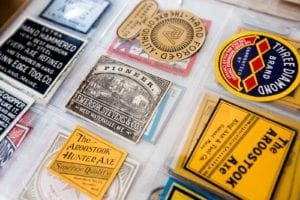“I had this little set of books, maybe a couple inches wide. They were fairy tales. I slept with them in my bed, clutching them against my chest,” Koch explained. “I didn’t have a stuffed animal or anything — it was the books that I wanted to be with, even at that young age.”
For as long as he can remember, Koch has been an avid reader, encouraged by both his parents to feed a vociferous appetite for knowledge, steadily supplied throughout his youth by his father’s immense book collection. And when young Koch wasn’t paging through his latest written adventure, he was out and about in the Maine woods, fishing, driving down logging roads with his dad, or even studying nature in his own Maine backyard.
Koch can’t exactly pinpoint the moment that love for the written word evolved into book collecting — when avid reading evolved into bibliophilism — but it all came to a head when he took first place in this year’s National Collegiate Book Collecting Contest for his submission “The Breath and Breadth of the Maine Woods.” A true labor of love, the collection reflects years of picking through barn sales, bookstores and yard sales, with a wide reflection of written paraphernalia beyond books, including field guides, maps, advertisements, postcards, and even axe labels, with many dating back to the mid-19th to 20th century.
Established in 2005 to recognize outstanding book collecting efforts by college and university students, the National Collegiate Book Collecting Contest encourages young collectors to become accomplished bibliophiles. Judges award prizes based on “the intrinsic significance, innovation and interest of book collections,” with evaluations made on entrants’ “understanding of their collections’ subjects, their use and citation of previously-published bibliographical materials, and their knowledge and appreciation of the items in their collections both for content and as objects of craft.” Contest judges also consider “how collections may help preserve material that could otherwise be lost or forgotten, and the potential of collections to expand and evolve.”
The age, rarity and uniqueness of the items in each submitted collection were assessed independently of monetary value — which for Koch is good, because while he thinks “rarity is certainly important, the most important part to me is the words.”
“My real goal is to find interesting books that I want to read,” Koch said. “I read them all.”
On top of being a Maine history bibliophile, Koch also restores Maine made nineteenth-century logging, woodworking and agricultural tools for a living. He’s done displays around the state showcasing Maine’s toolmaking heritage, which he sees as a direct tie-in to the Maine Woods and the types of books he collects. Koch sees the tools as part of the beginning of the region’s story — toolmakers made the tools that felled the trees, and those trees turned into logs, which turned into carriages and ships, barrels, and all the things that were important to Maine’s early industries and people.
“There’s a difference between a hoarder and a collector,” Koch joked. “I’m building and curating a collection that I hope will be available to the public someday. My goal is to eventually open a museum of Maine Made tools, with all the books and everything related to the Maine woods, and really showcase our history.”
In addition to a $2,500 first place award that Koch will receive at an official ceremony at the Library of Congress in October, Unity College will also receive a cash prize of $1,000, dedicated to the Dorothy Webb Quimby Library.
“In many ways, this story is such an expression of Alex’s connection to our region and school,” Unity College President Dr. Melik Peter Khoury said. “That he is working to turn his education and passion into a real life manifestation that others can learn from and enjoy really embodies everything we teach here at Unity College. We are so proud of Alex and his continued pursuit of enterprise education, both on and off campus.”
Unity College’s Alex Koch takes home first prize in National Collegiate Book Collecting Contest

Some of the axe labels Alex Koch, Unity College ‘19, has collected as part of “The Breath and Breadth of the Maine Woods.” The collection draws on a wide range of sources, from field guides to poems to postcards, to tell an important story about the history of the Maine Woods. “These are some of the things that perhaps set my collection apart from others,” Koch said while showing off the labels. “They’re very unique and they’re very different.”



